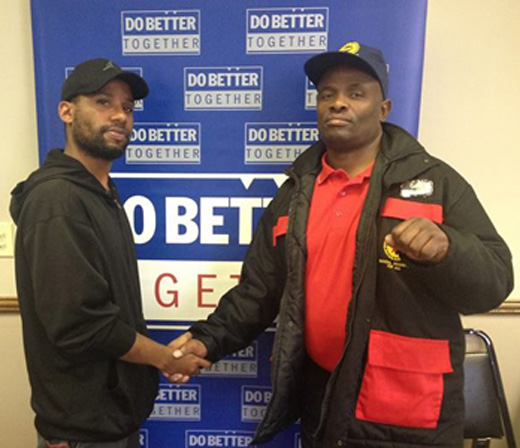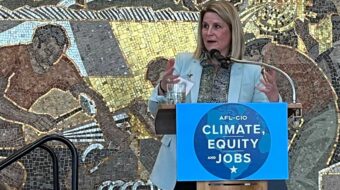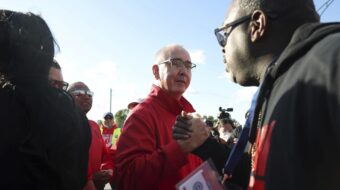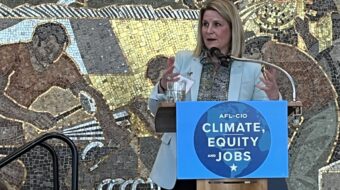
JACKSON, Miss – In a stunning reversal of what many would think is the way things work, a support group from “third world” South Africa is in Mississippi this week helping Americans secure one of their most basic democratic rights – the right to form a union.
“You can win this,” said Cedric Gina, president of the National Union of Metalworkers of South Africa (NUMSA), when he met this week with workers who have been trying for years to form a union at the Nissan plant in Canton.
The impoverished Mississippi Delta residents listening to him have had to battle Nissan every step of the way in a long and difficult quest to win recognition of the United Auto Workers as their bargaining agent. They have been harassed, harangued with anti-union propaganda, have had their hours slashed and some have even been fired, they say, as Nissan retaliates regularly against anyone it identifies as being pro-union.
“Our visit is very symbolic given the immense contribution made by the U.S. anti-apartheid movement to our own struggle for national liberation and freedom,” Gina said, commenting on his visit to Canton this week. “Our own union is a proud product of solidarity and working-class internationalism. It was our friends in the U.S. civil rights and labor movements that helped us secure the release of the founding general secretary of our union who had been jailed by the heinous apartheid regime 26 years ago.”
“We are proud to have NUMSA with us in Mississippi,” said UAW President Bob King. “It is great for workers in Mississippi to see South African workers who struggled under intensely difficult circumstances. They fought hard, overturned apartheid and have won impressive social gains for workers. They have proven and they show us how strong unions can build a more just society.”
One of the community groups supporting the Nissan workers and playing a leading role in hosting the South Africans in Canton is the Mississippi Student Justice Alliance. Tyson Jackson, the group’s executive director, and a student at Tougaloo College, described the visit of the South Africans as “totally awesome.
“You had to see workers at the plant, opening their eyes wide and smiling, as the South Africans told them in detail about the things they are allowed to do at work because they have a union, as they listened to what it is like to work at a place where you are respected as a human being,” Jackson said.
“For me,” Jackson added, “It was like listening to a story about the old days when there was a powerful UAW organizing and winning victories at big plants all over the country. I came up after the great civil rights movement but I can see, once again, from this visit how important that movement was.”
Tyson said the effort to organize the plant in Canton, in the heart of a “right to work for less state,” is critically important to the future of the UAW. Foreign automakers are coming into the south, he said, looking for cheap labor and unless plants in southern states are unionized wages will be driven down all across the country.
The battle in Canton is one to organize 5,200 workers in a plant that builds 450,000 vehicles a year. Nissan is now the state’s second largest private sector employer.
Right to work for less states don’t do well at all for their citizens, Tyson said.
Mississippi, which enacted right to work in 1954, ranked 50th in per capita income last year.
The Economic Policy Institute has said that Mississippi has the highest poverty rate and the lowest test scores in the country.
Photo: Keashaun Jones with President Gina. President Gina said he will closely monitor the situation to make sure none of the workers who met with him will face retaliation from Nissan. Do Better Together Facebook page.












Comments